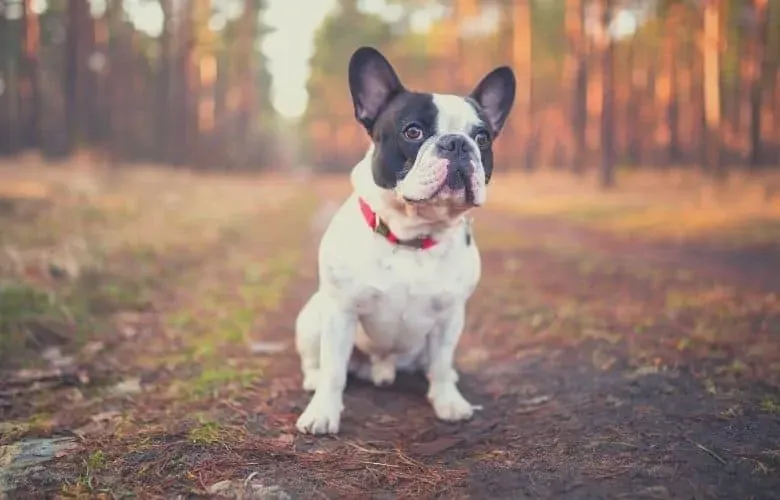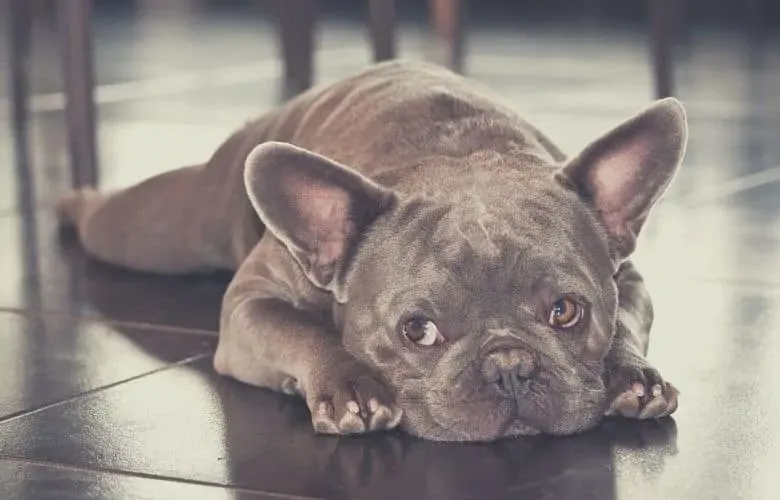If you are looking for a dog who is the perfect companion in an apartment, the French Bulldog may be a good choice. In this article, you will find all the important information about this breed. I will write about this dog’s history, personality, grooming, and nutritional needs. In the end, you will see that it is a small but more interesting and valuable breed of dog.
Let’s start!

Basic stats:
- Height: 11-13 inches
- Breed Group: Companion Dogs
- Weight: 11-28 pounds
- Life span: 11-14 years
About French Bulldogs in Brief
This breed is undoubtedly unique and special in appearance. Obviously, there are dogs that look prettier and more aesthetically pleasing, but nonetheless, these dogs are extremely good companions.
These are completely average dogs with average need for exercise. They love to play but are happy to relax with their owner on the couch. They are also small but muscular. Their personality and coat are also easy to handle.
Basically, Frenchies are sensible and intelligent. They love to play and you can also train with them as long as it’s fun. They are not the most ideal breed for competing in obedience or agility. Although sometimes there are outstanding French Bulldogs in these games as well.
These Bulldogs are social creatures. If you want a dog that stays out in the garden for a long time, this breed will not be the right choice for you. They love everyone, even the kids. At times, however, they can be possessive, aggressive, and territorial. This is especially true if there are other dogs nearby. This is why it is critical to start early socialization. They definitely need a consistent and patient owner.
French Bulldogs are very good watchdogs. They are great at alerting their owners to the approach of strangers. They will protect their home at all costs if that is the situation.
The Frenchies don’t need a lot of space, they’re more comfortable in an apartment than in a huge garden house. Their need for movement is not great either. If you are a busy person who cannot or does not want to walk with your dog for one or more hours a day, then the French Bulldog is the dog for you. Because of any breathing difficulties, this dog needs a cool environment.
They are very good companions, gentle and good-natured. They love every minute spent with the owner. Those who have such a dog can’t even imagine their life without them after a while.
History of French Bulldogs
In the mid-1800s, small-size Bulldogs were discovered in English cities, including Nottingham. It was the center of lace-making in this city, so this breed soon became the mascot of lace-makers.
Due to the Industrial Revolution, many lace makers moved to France. Of course, they also took these small Bulldogs with them. These dogs have become very popular in France. They have also been crossed with many other breeds, such as Terriers or Pugs. Their appearance today is due to this process. Their name was Bouledogue Français in France.
The popularity of these dogs grew rapidly in Paris. They came to be associated with city life, with cafes, and they were depicted by famous painters. By the end of the century, Frenchie was growing in popularity throughout Europe and America.
Since the early 1900s, only dogs with bat ears have been considered to belong to this breed. Since then, the French Bulldog has been recognized around the world for its special characteristics.
Some Interesting Facts About French bulldogs
- The ancestors of the French Bulldogs are the English Bulldogs.
- They were bred as pets, but they are excellent watchdogs.
- The two most characteristic features of the breed are bat ears and half-flat, half-domed skull.
Personality of french bulldogs
These dogs are smart, intelligent, and very much in love with their owners. They love being with people and spending quality time with them. They can be trained very well. Of course, rewards and treatments will definitely be needed.

Health Care
There are diseases and conditions specific to this breed that are worth preparing for. Of course, it’s not that all of these will happen to your dog. By the way, if you buy a dog from a good breeder, a significant amount of these diseases can be screened out in time.
Hip dysplasia
It is one of the most common diseases in dogs, and the French Bulldog is no exception. This is an inherited condition. The femur does not fit well with the hip joint. Sometimes it is asymptomatic, but most often it has noticeable signs. These are pain and lameness.
Later, hip dysplasia can develop into arthritis, which is accompanied by additional pain. You can apply for screening at the Orthopedic Foundation for Animals or the University of Pennsylvania Hip Improvement Program.
Dogs with hip dysplasia are not recommended for breeding.
Brachycephalic Syndrome
This disorder occurs in dogs similar to French Bulldogs. By this, I mean short heads, narrowed nostrils, or elongated or soft palates. In these dogs, the airways are obstructed to some degree, and this can lead to a number of problems. The most common symptoms are noisy or labored breathing. But even a complete collapse of the airways can occur.
Snoring is quite common in these dogs. There are many ways to deal with this problem. The most common is oxygen therapy or surgery.
Allergies
There are three types of this. One is food allergies. This should be treated by removing foods that are harmful to the dog from the diet. Contact allergy is similar. In this case, dogs react badly to dust, shampoos, or various chemicals. The solution here is to remove the cause of the problem. Inhalation allergies can be caused by pollen, dust, or mold. Treatment for this depends, among other things, on the severity of the disease.
Hemivertebra
This is a disorder of the vertebrae. In this case, they are wedge-shaped or triangular. The condition may be asymptomatic, but there may even be pressure on the spinal cord. Signs of this include pain, weakness, or paralysis. The problem is not easy to deal with.
Patellar Luxation
This problem is quite common in small dogs. The patella consists of three parts. The femur, knee cap, and tibia. For Patellar Luxation, these three parts are not properly lined up. This can cause abnormal gait, such as lameness. It is a birth defect, but in many cases, the symptoms do not appear until later. This degenerative disease can also lead to arthritis later on. Patellar Luxation has four stages. More severe cases can be repaired surgically.
Intervertebral Disc Disease
This condition occurs when the plate in the spine ruptures or in the case of a hernia. This can be from trauma, aging, or heavy exertion. Symptoms may include pain, weakness, or temporary paralysis. It can be treated usually with anti-inflammatory drugs for dogs. In some cases, surgery can also be effective. In addition, you can try physical rehabilitation, massage, water treadmills, and electrical stimulation.
Von Willebrand’s Disease
This disease is blood-related and is common in both humans and dogs. It results in a decrease in blood clotting. Symptoms include epistaxis, bleeding gums, prolonged bleeding from a surgery, and prolonged bleeding during heat cycles or after whelping. Unfortunately, this disorder is not curable. But can be treated well with cauterizing or suturing injuries. Some transfusions and avoiding certain medications may also be helpful.
Cleft Palate
The palate has two parts: hard and soft. The cleft palate has a slit. This can be of different sizes and can affect both the hard and soft palate. This can be a congenital thing in puppies, but it can also happen as a result of an injury. Many of the puppies born with cleft palate do not survive. The only option is to treat the surgery.
Elongated Soft Palate
This disease is the extension of the roof of the mouth. It can be dangerous as it causes breathing difficulties. Can be treated with surgery.
Feeding and nutrition
As with all dogs, good quality food is important for French Bulldogs. Of course, a puppy, an adult, and a senior dog have different nutritional needs. Calorie intake also depends on many factors, such as activity levels. Be sure to consult your veterinarian about this.
Frenchies gain weight very easily. You need to pay attention to this because obesity can cause other health problems as well. Treats can be used for training, but in moderate quantities. Also, give your dog a little human food from the table. Avoid cooked bones and foods containing much fat.
Click here if you want to learn about what human foods are safe and unsafe for dogs.

Coat and Grooming
The hair of this breed is short, smooth, and shiny. Their skin is also soft, slightly wrinkled. There can be many variations in the color of the coat of French Bulldogs. Occurs include fawn or cream. Sometimes dark and light streaks or other patterns may alternate.
Virtually a French Bulldog occurs in almost any color except a few. For example, solid black, liver, light gray or black and white. It’s important to note this because you shouldn’t pay more money for a Frenchie because the breeder “lies” that the actual color is very rare. But for that reason, don’t even have expectations about the color of your new puppy.
In general, these dogs are very easy to groom. They don’t shed too much. It is important to start grooming your puppy at a young age to get used to this experience. Check the coat and skin each time for any defects or discrepancies. Do the same with the eyes, ears, and teeth. If you notice any abnormality (scabs, signs of infections, bad smell, etc.) then it is time to consult your veterinarian.
Regular cleaning of the ears is important. Do this with a cloth and a cotton ball. Make sure that the cotton ball does not stick to the ear canal. Use mineral or baby oil on dry ears. The same is true with a dry nose.
Nail trimming is important for French Bulldogs as they don’t really wear out their nails naturally. If you choose the best dog nail grinder, you can even do this task at home.
One bath per month is recommended. Of course, if necessary, this number can be more. Use good quality dog shampoo. Be sure to dry your puppy’s hair and skin properly after bathing. This is important to avoid bacterial infections.
Frenchies are easy to groom. They can be an enjoyable activity with proper training, positive reinforcements, and rewards.
Exercise
French Bulldogs don’t need a lot of exercises. 1-2 short walks a day and a little play is plenty for them. They perform well in canine sports, such as obedience or agility. Due to their physical endowments, this breed often has difficulty breathing. For this reason, you need to be careful that your Frenchie does not overdo the activity. Especially in warmer weather conditions.
Training
As with many other breeds, it is worthwhile for French Bulldogs to start socializing and puppy training as soon as possible. Getting started early can help develop the right behavior. Puppies need to get to know a wide variety of situations, people, animals, and places. And you need to recognize and correct the bad behavior.
French Bulldogs have an amazing personality and you can help with this with the right training. Sometimes they can be stubborn, but with some motivation (treats and love) you can easily reach your goal with them.
Behavior With Children And Other Pets
French Bulldogs get along very well with kids, even babies. However, I do not recommend that you leave your puppy alone with your child. After all, they both need to know each other and learn how to treat each other.
If you start socializing early, your Frenchie will get used to foreign dogs and other animals. This way you can avoid unnecessary aggression. It’s worth noting that Frenchies can easily be jealous when it comes to their beloved owner.
Summary
I think it is quite clear that the French Bulldogs have a lot of positive qualities. It is no coincidence that it has become one of the most popular breeds in France, but even around the world. With patience, proper training, and care, you can have a companion with whom it is a pleasure to live together in your apartment.

Frequently Asked Questions about the French Bulldogs
What dogs are compatible with French bulldogs?
Of course, the best choice is another French Bulldog. But a Boxer, Greyhound, or Labrador might be a good idea.
Is a French Bulldog a good family dog?
These dogs are cute and lovable. They are perfect as family dogs. Although they feel best in smaller houses or flats, believe me, they are more sturdy than you might suspect based on their size.
Are French Bulldogs high maintenance?
This question is, of course, subjective. I would rather call them average in terms of maintenance. Their medium-fine coat sheds on average. They rarely need brushing. However, due to their potential difficulty breathing, they may require special attention in relation to training, exercise, and weather.
Are French Bulldogs one-person dogs?
Everyone loves the delightfully special personality of the French Bulldogs. They usually love all people, but they tend to form a special relationship with only one person in their lives.

